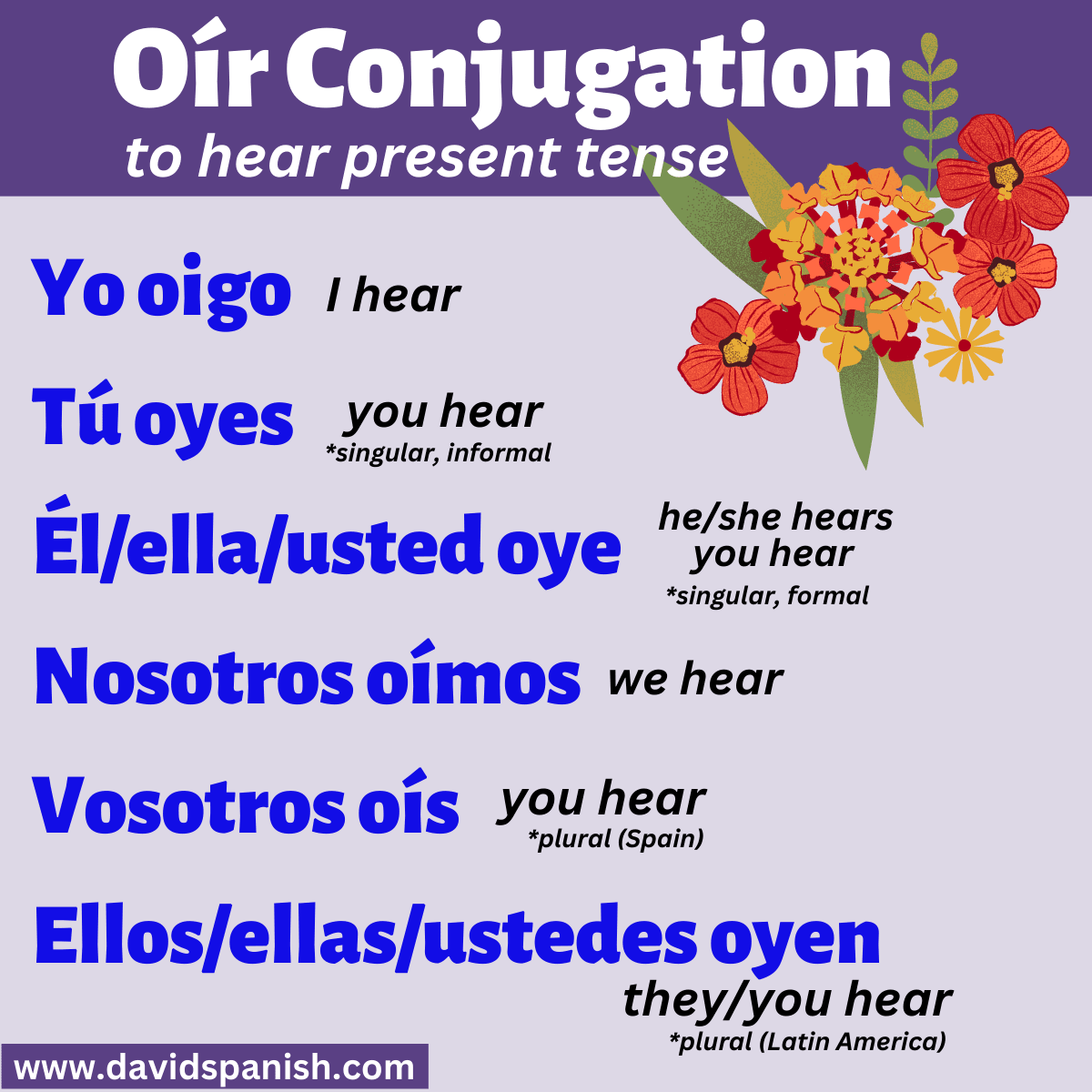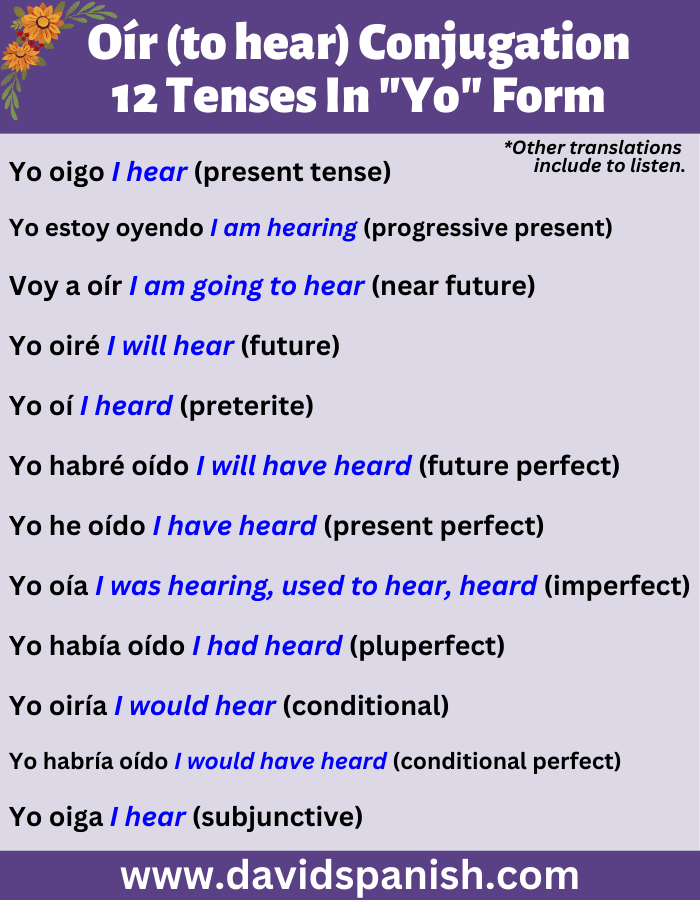Oír means both “to hear” and “to listen” in Spanish. The conjugation of oír in the present tense is: Yo oigo (I hear), tú oyes (you hear), él/ella/usted oye (he/she hears, you hear), nosotros oímos (we hear), vosotros oís (you hear) and ellos/ellas/ustedes oyen (you/they hear).

Oír is an irregular IR verb. This is because its stem when conjugated in the present tense is different from other regular IR verbs, such as vivir (to live). This page on our site covers regular and irregular Spanish IR verbs in detail.
Oír conjugation in the present tense

Further down the pages we provide conjugation tables for oir in the following tenses:
- Present tense (presente de indicativo)
- Progressive present (presente progresivo)
- Near future (futuro inmediato)
- Future tense (futuro)
- Preterite (pretérito)
- Present perfect indicative (perfecto de indicativo)
- Imperfect (imperfecto de indicativo)
- Conditional (potential simple)
- Present subjunctive (presente de subjuntivo)
- Imperative (imperativo)
Oír conjugation table

The following graphic shows how to conjugate oír in the first-person singular (yo) form in twelve verb tenses.

Oír conjugation charts
Present tense (presente de indicativo)
In the present tense, yo oigo translates to “I hear”, “I listen”, “I am hearing” and “I am listening”.
| yo oigo | I hear (or listen) | Oigo el teléfono. | I hear the telephone. |
| tú oyes | you hear | ¿Oyes lo que estoy diciendo? | Do you hear what I'm saying? |
| él/ella, usted oye | he/she hears, you hear | No oye mi voz. | He doesn't hear my voice. |
| nosotros oímos | we hear | Oímos los grillo en el patio. | We hear the crickets in the yard. |
| vosotros oís | you hear | ¿Oís el anuncio? | Do you hear the announcement. |
| ellos/ellas, ustedes oyen | they/you hear | ¿Por qué no oyen el tren? | Why don't they hear the train? |
Progressive present (presente progresivo)
The progressive present tense combines the present tense of estar (to be) in the present tense with the present participle. Yo estoy oyendo translates to “I am hearing” or “I am listening”.
| yo estoy oyendo | I am hearing (or listening) | Estoy oyendo música. | I'm hearing music. |
| tú estás oyendo | you are hearing | ¿Estás oyendo voces? | Are you hearing voices? |
| él,ella, usted está oyendo | he/she/you is (are) hearing | ¿Que está oyendo? | What are you hearing? |
| nosotros estamos oyendo | we are hearing | Estamos oyendo un sonido muy raro. | We're hearing a very weird sound. |
| vosotros estáis oyendo | you are hearing | ¿Estáis oyendo algo? | Are you hearing something? |
| ellos/ellas, ustedes están oyendo | they/you are hearing | No están oyendo nada. | They aren't hearing anything. |
Near future (futuro inmediato)
The near future tense combines the present tense of ir (to go) with the preposition a and an infinitive. Yo voy a oír translates to “I’m going to hear” or “I’m going to listen”.
| yo voy a oír | I'm going to hear (or listen) | Voy a oír el ruido. | I'm going to hear the noise. |
| tú vas a oír | you are going to hear | Vas a oír la publicidad. | You're going to hear the advertisement. |
| él/ella, usted va a oír | he/she/you is (are) going to hear | No va a oír nuestras voces. | He's not going to hear our voices. |
| nosotros vamos a oír | we are going to hear | Vamos a oír la llegada del coche. | We're going to hear the arrival of the car. |
| vosotros vais a oír | you are going to hear | Vais a oír sus instrucciones. | You're going to listen to their instructions. |
| ellos/ellas, ustedes van a oír | they/you are going to hear | Van a oír el ruido de las ondas. | They're going to hear the sound of waves. |
Future tense (futuro)
In the future tense, Yo oiré translates to “I will hear” or “I will listen”.
| yo oiré | I will hear (listen) | Oiré los pájaros piando. | I'll hear the birds chirping. |
| tú oirás | you will hear | Oirás mi voz en diez minutos. | You'll hear my voice in ten minutes. |
| él/ella, usted oirá | he/she/you will hear | Ella oirá el ruido del motor. | She'll hear the sound of the motor. |
| nosotros oiremos | we will hear | No oiremos los vecinos hablando. | We won't hear the neighbors talking. |
| vosotros oiréis | you will hear | Oiréis la música del concierto. | You'll hear the music from the concert. |
| ellos/ellas, ustedes oirán | they/you will hear | Oirán el sonido de la guitarra. | They'll hear the sound of the guitar. |
Preterite (pretérito)
The preterite is a past tense used to express past actions which occurred at specified times. Yo oí translates to “I heard” or “I listened”.
| yo oí | I heard (or listened) | No oí las noticias. | I didn't hear the news. |
| tú oíste | you heard | ¿Oíste lo que dije? | Did you hear what I said? |
| él/ella, usted oyó | he/she/you heard | No oyó nada. | He didn't hear anything. |
| nosotros oímos | we heard | Ya oímos su argumento. | We already hear your argument. |
| vosotros oísteis | you heard | ¿Cómo oísteis este rumor? | How did you hear this rumor? |
| ellos/ellas, ustedes oyeron | they/you heard | ¿Cuándo oyeron las noticias? | When did they hear the news? |
Present perfect indicative (perfecto de indicativo)
The present perfect is used to express past actions which have a bearing on the present. Yo he oído translates to “I have heard” or “I have listened”.
| yo he oído | I have heard (or listened) | No he oído nana. | I haven't heard anything. |
| tú has oído | you have heard | ¿Has oído las noticias? | Have you heard the news? |
| él/ella, usted ha oído | he/she/you have (has) heard | No ha oído a su patrón. | He hasn't listened to his boss. |
| nosotros hemos oído | we have heard | Hemos oído muchos rumores. | We've heard a lot of rumos. |
| vosotros habéis oído | you have heard | ¿Habéis oído su acento? | Have you heard his accent? |
| ellos/ellas, ustedes han oído | they/you have heard | Han oído todas las reglas. | They've heard all the rules. |
Imperfect (imperfecto de indicativo)
The imperfect tense is used to express past actions which occurred at unspecified times. Yo oía translates to “I used to hear” and “I was hearing”.
| yo oía | I was hearing (or used to ear, was listening, used to listen) | Cuando era un niño oía voces. | I used to hear voices when I was a child. |
| tú oías | you were hearing | Oías simepe a los mayores. | You used to always listen to elders. |
| él/ella, usted oía | he/she/you was (were) hearing | No oía a sus padres. | She wasn't listening to her parents. |
| nosotros oíamos | we were hearing | Oíamos simpre los sonidos de la naturaleza. | We used to always listen to the sounds of nature. |
| vosotros oíais | you were hearing | ¿Es verdad que oíais a vuestros profesores? | Is it true that you used to listen to your teachers? |
| ellos/ellas, ustedes oían | they/you were hearing | Nunca oían a los instructores. | They never used to listen to the instructors. |
Conditional (potential simple)
The conditional tense is used to express hypothetical actions. Yo oiría translates to “I would hear” or “I would listen”.
| yo oiría | I would hear (or listen) | Oiría la música si el volumen fuese más alto. | I'd her the music if the volume were higher. |
| tú oirías | you would hear | ¿Oirías mi voz si hablase con claridad? | Would you hear my voice if I spoke clearly? |
| él/ella, usted oiría | he/she/you would hear | Oiría las ondas si estuviese en playa. | He'd hear the waves if he were on the beach. |
| nosotros oiríamos | we would hear | Oiríamos los grillos si estuviésemos en el bosque. | We'd hear the crickets if we were in the forsest. |
| vosotros oiríais | you would hear | Oiríais al bebé si estuvieseis en su habitación. | You'd hear the baby if you were in his room. |
| ellos/ellas, ustedes oirían | they/you would hear | Oirían los pájaro si estuviesen en la selva. | They'd hear the birds if they were in the jungle. |
Present subjunctive (presente de subjuntivo)
The subjunctive mood is used to express wishes, emotions and doubts. Yo oiga translates to “I hear” and “I listen”.
| yo oiga | I hear (or listen) | Es importante que oiga las instrucciones. | It's important that I listen to the instructions. |
| tú oigas | you hear | No pienso que me oigas. | I don't think you hear me. |
| él/ella, usted oiga | he/she/you hears (hear) | Es dudoso que me oiga. | It's doubtful he hears me. |
| nosotros oigamos | we hear | ¿Es posible que oigamos a un fantasma? | Is it possible we hear a ghost? |
| vosotras oigáis | you hear | Es magnífico que nos oigáis. | It's splendid you hear us. |
| ellos/ellas, ustedes oigan | they/you hear | Quiero que oigan las reglas. | I want them to listen to the rules. |
Imperative (imperativo)
The imperative is used to give commands and make suggestions. Example sentences are under the chart.
| (tú) ¡oye! | Listen! (or Hear!) | ¡no oigas! | Don't listen! |
| (usted) ¡oiga! | Listen! | ¡no oiga! | Don't listen! |
| nosotras) ¡oigamos! | Let's listen! | ¡no oigamos! | Let's not listen! |
| vosotras) ¡oíd! | Listen! | ¡no oigáis! | Don't listen! |
| (ustedes) ¡oigan! | Listen! | ¡no oigan! | Don't listen! |
- ¡Oiga me! Listen to me!
- ¡No oigas pendejadas! Don’t listen to nonsense!
- ¡Oigamos lo que piense! Let’s listen to what he thinks.
- ¡Oye! ¿Qué opinas de mi idea? Listen! What do you think of my idea?
Discover more:
- Venir (to come) conjugation
- Dormir (to sleep) conjugation
- Hablar (to speak) conjugation
- Volver (to return) conjugation
- La Bamba Meaning, Spanish Lyrics & English Translation - May 4, 2024
- Bésame Mucho Meaning, Spanish Lyrics & English Translation - May 3, 2024
- Querida – Lyrics, Meaning & Translation - May 2, 2024
